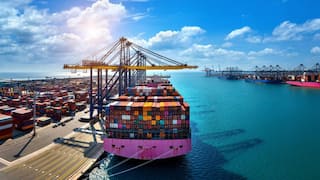India’s Investment In Water Sector To Be Highest In The World By 2024: Gajendra Shekhawat At Isha Insight 2022
Union Minister Gajendra Singh Shekhawat was addressing the third day of the 11th edition of Isha Leadership Academy’s flagship program when he spoke about the Jal Jeevan Mission.

New Delhi: Gajendra Singh Shekhawat, the Union Cabinet Minister in the Ministry of Jal Shakti, on Saturday said that India’s estimated investment in the water sector will be the highest in the world by 2024.
“India’s estimated investment in the water sector from 2019 to 2024 at $210 billion is the highest in the world,” he said, emphasising that managing water is a collective responsibility and everyone has to work together in this direction. The Union Minister was addressing the third day of the 11th edition of Isha Leadership Academy’s flagship program - “Isha Insight: The DNA of Success” at the Isha Yoga Center in Coimbatore.
In conversation with Isha Foundation Founder Sadhguru, Gajendra Shekhawat spoke about the Jal Jeevan Mission which aims to provide safe and adequate drinking water through individual household tap connections to all households in rural India by 2024.
Union Minister for Jal Shakti @gssjodhpur, who is spearheading the most revolutionary project of quenching India’s thirst one tap at a time, joins @SadhguruJV for a conversation at #IshaInsight, and gives participants a candid perspective on scaling up.@MoJSDoWRRDGR pic.twitter.com/Inpu0YdyxJ
— Isha Leadership Academy (@IshaLeadership) November 26, 2022
Sadhguru appreciated the Mission's model of implementation and said, “I think the best part of the mission is - it is community-managed. It is government-installed but community-managed. I think that is a way forward for a country like this, otherwise, the government doing the service all the time is never going to work till the last mile.”
"The best part of the @jaljeevan_ mission launched by @gssjodhpur is that it is government-installed but community-managed. This is the way forward for India. Otherwise, with the government doing the service all the time, it will never reach till the last mile," says @SadhguruJV
— Isha Leadership Academy (@IshaLeadership) November 26, 2022
According to the Jal Jeevan Mission dashboard, 16% of Indian Households in 2019 had access to tap water connection which has now grown to 54%. However, the focus of the mission, pointed out by the Union Minister, is not just about the accessibility of water but on ensuring water quality.
To ensure water quality in the rural parts, the ministry is engaging the rural community and leveraging technology to craft innovative solutions. The Jal Shakti Ministry has created water and sanitation committees in each and every village which comprise 21 people with a minimum of 50% women. “We then started training the ladies in the villages and gave them hand-held devices to test the quality on all basic 12 parameters. They can test the water in their village frequently, at least in a month's time or in a week's time,” Shekhawat informed.
The minister, recognising the future of the Internet of Things (IoT) and Sensor-based solutions, said that the ministry is now inviting Indian start-ups to contribute in this area and floated a hackathon inviting start-ups. Out of the 220 start-ups that registered, the ministry arrived at two start-ups that are now serving at more than 100 locations in the country in different geographical areas. for everyone to see. ”Online real-time report of the quality of the water which is being distributed comes to my office. Everything, whatever I'm talking about, the entire mission is in the public domain,” Shekhawat said.
Earlier in the day, Aravind Melligeri, Chairman, and CEO, Aequs took shared his journey of setting up a manufacturing company. Aravind mentioned his organisation’s values of Transparency, Trust, and Respect, and pointed out the lack of respect for workers in manufacturing as one of the biggest challenges.
“They get yelled at, scolded. Irrespective of whatever they're doing, they don't get respect. So we said irrespective of who in the organisation it is, he has to be respected. Whether it's a driver, cleaning, sweeping person, shop floor employee, blue collar, or white collar, everybody should be respected. I have let more people go for violating the respect principle than anything else in my organisation,” he said.
"When you take a person, put him in the right environment and give him the right set of tools, you can transform the person. So it is our job to identify, put them in the right environment and make value out of them." - @amelligeri, Chairman & CEO, @AequsPvtLtd pic.twitter.com/158AjpJy7p
— Isha Leadership Academy (@IshaLeadership) November 26, 2022
When asked about his views on expanding semiconductor manufacturing in India, Aravind said he preferred directing investments in packaging and PCBAs, and other elements that would create more jobs rather than chasing the wafer manufacturing business. “We got to look from the job creation perspective as a country because that is the most important thing. If I was given the money, I would put it in packaging and PCB, kind of a component manufacturing…there's so much vertical integration that can happen at a much lower cost than choosing a wafer,” he mentioned.






































